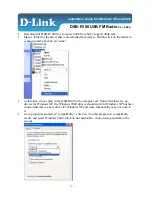
44
CCDI
TM8100/TM8200 Computer-Controlled Data Interface (CCDI) Protocol Manual
© Tait Electronics Limited
April 2007
■
[VERSION] is the CCDI software version. A character string, in the
format of XX.XX, identifying the capabilities of the radio operating in
CCDI mode.
Example
m0813102.03A3
This message is sent is response to a QUERY q002F
command. It indicates that the radio is a Conventional,
TM8105/TM8115 radio with a small display, and the
CCDI version is 02.03.
1.10.5
PROGRESS
Unsolicited.
The PROGRESS message advises the PC of the radio status when some
significant change of state in the radio occurs (typically during call
processing). PROGRESS messages are not sent by the radio while the radio
is in Transparent mode.
Format
p [SIZE] [PTYPE] [PARA1] [PARA2] [CHECKSUM]
■
‘p’ is sent as a single ASCII character and represents the PROGRESS
command.
■
[PTYPE] is two ASCII hex characters which identify the progress
message category.
■
[PARA2] is appended if [PTYPE] is 21, 22, or 23.
[PTYPE]
[PARA1]
Function
00
none
Call Answered
A standard Selcall or Type 99 call has been answered. This message will be sent when
the call has been answered either by the PC or manually by the user.
01
none
Deferred Calling
Deferred calling is in progress. This message will be sent every three seconds while the
radio is still waiting to make the deferred call.
02
none
Tx Inhibited
Transmission has been inhibited. This message will be sent whenever transmission is
requested but is inhibited.
03
none
Emergency Mode Initiated
The radio has been put into emergency mode. This message will be sent when the
radio’s emergency mode switch is activated.
04
none
Emergency Mode Terminated
The radio is no longer in emergency mode. This message will be sent when the radio
receives a “reset” to take it out of emergency mode. The reset can be a Remote
Monitor Reset (enabled in programming application), a power off and on, or a CANCEL
command.
05
none
Receiver Busy
The receiver has detected an RF signal on the current channel. This message will be sent
when the current channel becomes busy.
















































